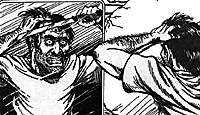Warning!
If, on the other hand, you're an OTE GM whose players have already bought the book, this article may allow you to turn the tables on players who think they know the whole story.
Chaosium's Call of Cthulhu is an Origins-winning favorite. Atlas Games' Over the Edge has been on the cutting edge since it came out in 1992. Combining the two is easy, fun, and gives you so many ways to mess with the minds of your characters that a GM can get dizzy trying to choose.
Ronnalee Dondo smoked a cigarette and looked across the Plaza of Justice. A hanging was scheduled. Since Al Amarja had no laws against cruel or unusual punishment, one of the prisoners (convicted of arson, she thought) was being given the option of pleading for his life before the crowd. He was begging, talking about his mother and his two daughters...
"Bark like a dog!" someone in the crowd shouted. The arsonist faltered, but soon the cry was taken up by all who had gathered to watch. "Bark! Bark! Bark!"
"Woof," he said, hesitantly. The crowd applauded. "Woof, woof!" the arsonist said, louder. The crowd laughed hysterically. Though shrouded by a black hood, even the executioner seemed amused.
"What say ye, citizens? Should we spare him, or does he die?"
Ronnalee shook her head as the prisoner's face was suffused with hope. He was unshaven and pale and had a fat black eye, but at that moment he had a heartbreaking beauty. She smiled sadly. She knew what was coming.
"DIE!" screamed the crowd.
The arsonist looked sick with shock as the hangman tightened the hemp rope around his neck. Then he started screaming.
"You bastards! I barked for you! I..."
He dropped, twitched and struggled, then was still.
On a balcony overlooking the plaza, three self-appointed judges held up placards, expressing their opinions on the quality of the execution. The numbers were 6, 8 and 9. There was usually a fourth member, an American businessman named David Van Osten. Ronnalee knew him well.
Van Osten had come to the island in the sixties - allegedly because he liked to watch executions. Ronnalee knew better.
If David had gotten his hands on that punk, the poor kid would have begged to be humiliated and hanged, she thought. She'd seen photos of what David had done to his rivals; he kept them on his mantle.
For six years, Ronnalee had been David's lover. She had endured it in order to learn more about the sinister group to which he belonged - an organization called the Movers. He trusted her, and today he was to be inducted into the highest level of control (he suspected - though with Movers, there was always the chance of a higher, subtler level of control).
She waved down a cab (for Ronnalee, as for everyone highly placed in the Movers, there was always a cab there when needed) and asked it to take her to his apartment.
- He should be done with it by now.
As soon as she had found out enough about the initiation and the highest levels from him, Ronnalee planned to flee back to her husband Merle and their two daughters. The organization to which she and Merle belonged could protect them from the Movers - she hoped.
She also planned to kill Van Osten. She owed it to herself. Promising herself that she would kill him one day had been the only thing that had gotten her through six years with him. It was against the principles of her organization, but she knew they'd overlook it, forgive it, to find out about the ultimate rulers of the Movers.
She let herself into his penthouse with her key.
"David?" she asked.
"In the kitchen. You can help me."
Something about his voice made her furrow her brow. She had heard him angry, and capricious, and on only two occasions frightened; but this was the first time he had ever sounded... disoriented?
The kitchen was spattered with blood. David had a mirror propped on the stove and was using a J.A. Heckels serrated bread knife to saw at the skin of his forehead. Blood streamed down his face as he turned to her.
"Ah, darling... would you help me saw through my skull, please? They have put thoughts in my head, and I must remove them."
In his eyes she could see nothing sane.
Surreal, conspiracy-based adventure. Mind-blasting horror from the great, chaotic beyond. Two great tastes that taste great together, right?
Chaosium's Call of Cthulhu is an Origins-winning favorite. Atlas Games' Over the Edge was on the cutting edge when it came out in 1992, and most of the gaming industry still hasn't caught up. Combining the two is easy, fun, and gives you so many ways to mess with the minds of your characters that a GM can get dizzy trying to choose. However, a few guidelines are useful for integrating the two settings.
First, there's the question of tone. Both games have horrific elements, but Over the Edge is not, specifically, a horror game. Its tone is one of surreal uncertainty and investigation, but the characters are, in the long run, able to affect the outcome of events. They can make a difference.
In Call of Cthulhu that's just not true. Sure, a Mythos investigator may be able to forestall the dread plans of a cult... for now. But there's always the nagging knowledge that when the stars are right, ain't nothin' gonna save humanity's collective bacon. Sorry, no. Elder chaos is on the way; our delusions of order and sanity are just an anomalous blip in the cosmic fabric. Like a trick of perspective, circumstances on earth conspire to make it appear that the universe is solid and stable and sane; but when you know what's really going on, all that order has the solidity of a soap bubble.
Because OTE focuses on character, the PCs generally interact with greater forces - and through strategy, guts or cleverness, they can sometimes improve things for themselves and their fellows. CoC concentrates much more on setting, so characters are more like the Norse deities; Ragnarok is on the way, nothing can save you, and your best hope is to enjoy things now before they get much worse.
That, at the bottom, is the difference between OTE and CoC. In OTE, things appear pretty bad; you get a little deeper, and they appear much worse; but there's always the hope that evil can be stopped and that things can get better. In CoC, things seem fine on the surface; but the deeper you go, the worse it becomes, culminating in the knowledge that sooner or later, the Old Ones will rise.
A GM who is aware of these differences in tone can play them to his or her own taste. Perhaps the secretive conspiracies of Al Amarja could provide humanity's best hope against mythos threats - if they were only aware of the cosmic evil that threatens their own petty plots. On the other hand, imagine the chagrin of a character who thought he had it all figured out, only to learn that there were maddening deeper levels of conspiracy. "You mean I've spent the last two years of game time, eight months of game sessions, tracking down the mystery of the Pharaohs... and they're only a smokescreen for something else?!"
In other words, there are two ways you can play this; start the characters in "Call of Cthulhu" and have them end up in Al Amarja, or start them in the setting of "Over the Edge" and only gradually introduce Mythos threats.
 If you ever want to have the enjoyable ignorance necessary to truly savor the subtleties of being a player in an Over the Edge and/or Call of Cthulhu game, do not read this article! It gives away a whole lot of stuff.
If you ever want to have the enjoyable ignorance necessary to truly savor the subtleties of being a player in an Over the Edge and/or Call of Cthulhu game, do not read this article! It gives away a whole lot of stuff.
Intro
 And what was that strange rasping sound?
And what was that strange rasping sound?
Tone
Back to Shadis #33 Table of Contents
Back to Shadis List of Issues
Back to MagWeb Master List of Magazines
© Copyright 1997 by Alderac Entertainment Group
This article appears in MagWeb (Magazine Web) on the Internet World Wide Web.
Other military history articles and gaming articles are available at http://www.magweb.com